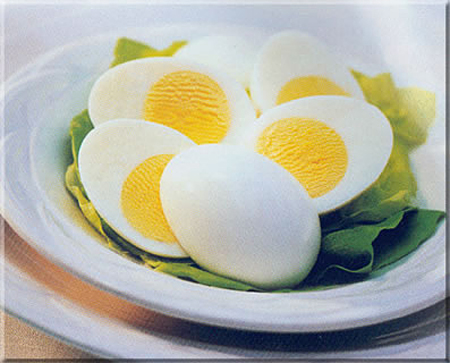
Eggs their beauty is in their simplicity
It truly pains me that in 2013, I still hear nubies in the health clubs, regurgitating some old cereal industry manufactured notion that we shouldn't eat egg yolks. WRONG ! Just last week I had to clue someone in at the gym. Once and for all let's get it straight. Whole eggs are one of if not the best source of protein, good fat ( omega 3's), selenium, folate and B vitamins. I think it is important to make the a distinction between eggs. All eggs are not created equal. It's important, to obtain the maximum benefits from the egg, you eat only organic eggs, fed organc feed, cage free with no hormones or antibiotics added. The organic feed chicken eggs have up to 20% more omega-3s (the healthy fats) than the factory grain-feed chicken eggs. You should at the very least eat eggs labeled "No Hormones." The popular misconseption that eating the yolk can lead to high cholesterol and is not heart healthy is FALSE information. Generated over 30 years ago with bias and flawed studies. The yolk is loaded with healthy omega-3s and other important nutrients. The yolk is more calorie dense than the white of the egg, but that's because it contains so much more.
 A Harvard Medical School study
of 115,000 subjects over a 14-year span showed no correlation between
eating one whole egg a day and heart disease or stroke. In addition,
another study I read from the International Journal of Obesity suggested that eating two whole eggs for breakfast over a bagel helped participant's lose weight. In
a randomized controlled trial, 160 overweight or obese men and women
were divided into 2 groups, one of which ate a breakfast including 2
eggs, while the other consumed a bagel breakfast supplying the same
amount of calories and weight mass (an important control factor in
satiety and weight loss studies). Participants ate their assigned
breakfast at least 5 days a week for 8 weeks as part of a low-fat diet
with a 1,000 calorie deficit. Compared to those on the bagel breakfast, egg eaters:
A Harvard Medical School study
of 115,000 subjects over a 14-year span showed no correlation between
eating one whole egg a day and heart disease or stroke. In addition,
another study I read from the International Journal of Obesity suggested that eating two whole eggs for breakfast over a bagel helped participant's lose weight. In
a randomized controlled trial, 160 overweight or obese men and women
were divided into 2 groups, one of which ate a breakfast including 2
eggs, while the other consumed a bagel breakfast supplying the same
amount of calories and weight mass (an important control factor in
satiety and weight loss studies). Participants ate their assigned
breakfast at least 5 days a week for 8 weeks as part of a low-fat diet
with a 1,000 calorie deficit. Compared to those on the bagel breakfast, egg eaters: - Lost almost twice as much weight, egg eaters lost an average of 6.0 pounds compared to bagel eaters 3.5 pound loss.
- Egg eaters had an 83% greater decrease in waist circumference
- Egg eaters reported greater improvements in energy
 Do you suffer from pain due to inflammatory
conditions, such as arthritis? You might find that egg yolks can be a
very beneficial addition to your diet. The choline, which is found in
egg yolks, is known to offer anti-inflammatory properties. You might
find pain relief by eating eggs, or at least reduce internal inflammation. Now although our bodies can produce
some choline, we can't make enough to make up for an inadequate supply
in our diets, and choline deficiency can also cause deficiency of
another B vitamin critically important for health, folic acid. Choline
is also a key component of acetylcholine. A neurotrasmitter that
carries messages from and to nerves, acetylcholine is the body's
primary chemical means of sending messages between nerves and muscles. In an editorial in the American Journal of Clinical Nutrition
entitled, "Is there a new component of the Mediterranean diet that
reduces inflammation?," Dr. Steven Zeisel from the University of North
Carolina at Chapel Hill noted that choline and betaine work together in the cellular process of methylation, which is not
only responsible for the removal of homocysteine, but is involved in
turning off the promoter regions of genes involved in inflammation. Egg
yolks are one of the richest source of choline. The Institutes of Medicine
Food and Nutrition Board specifies, women require 425 mg of choline
daily, and men need 550 mg daily. One large egg, about 70 g, provides
126 mg of choline. The best food sources of choline other than
eggs are meats, and nuts. Foods like spinach, beets and whole wheat
products are good sources of betaine.
Do you suffer from pain due to inflammatory
conditions, such as arthritis? You might find that egg yolks can be a
very beneficial addition to your diet. The choline, which is found in
egg yolks, is known to offer anti-inflammatory properties. You might
find pain relief by eating eggs, or at least reduce internal inflammation. Now although our bodies can produce
some choline, we can't make enough to make up for an inadequate supply
in our diets, and choline deficiency can also cause deficiency of
another B vitamin critically important for health, folic acid. Choline
is also a key component of acetylcholine. A neurotrasmitter that
carries messages from and to nerves, acetylcholine is the body's
primary chemical means of sending messages between nerves and muscles. In an editorial in the American Journal of Clinical Nutrition
entitled, "Is there a new component of the Mediterranean diet that
reduces inflammation?," Dr. Steven Zeisel from the University of North
Carolina at Chapel Hill noted that choline and betaine work together in the cellular process of methylation, which is not
only responsible for the removal of homocysteine, but is involved in
turning off the promoter regions of genes involved in inflammation. Egg
yolks are one of the richest source of choline. The Institutes of Medicine
Food and Nutrition Board specifies, women require 425 mg of choline
daily, and men need 550 mg daily. One large egg, about 70 g, provides
126 mg of choline. The best food sources of choline other than
eggs are meats, and nuts. Foods like spinach, beets and whole wheat
products are good sources of betaine. More than 90%
of Americans are choline-deficient. An assessment of American's dietary
choline intake by Iowa State University researchers, Jensen H,
Batres-Marquez S, et al.,in the FASEB Journal revealed that for older
children, men, women and pregnant women, intake is dramatically below
Adequate Intake (AI) levels, with only 10% or less of all these groups
getting even close to recommended amounts of choline. At the 31st
National Nutrient Data Bank Conference, Washington, DC, it was revealed
that choline intake decreases with age, with adults ages 71 and older
typically consuming an average of about 264 milligrams per day, roughly
half the Adequate Intake for choline.
More than 90%
of Americans are choline-deficient. An assessment of American's dietary
choline intake by Iowa State University researchers, Jensen H,
Batres-Marquez S, et al.,in the FASEB Journal revealed that for older
children, men, women and pregnant women, intake is dramatically below
Adequate Intake (AI) levels, with only 10% or less of all these groups
getting even close to recommended amounts of choline. At the 31st
National Nutrient Data Bank Conference, Washington, DC, it was revealed
that choline intake decreases with age, with adults ages 71 and older
typically consuming an average of about 264 milligrams per day, roughly
half the Adequate Intake for choline. Look,
if you don't have a history of elevated cholesterol, it probably won't
hurt to eat one or two whole eggs on a daily basis. If you have an
elevated cholesterol level or a history of heart disease, it's best to
check with your doctor before changing your diet. It's more important
to reduce
consumption of trans fats and processed foods that contain hidden
hydrogenated oil's, and sugars if you're concerned about heart health.That means
anything in a package or box. READ your
labels carefully. Those hidden fats, sugars and starches are much more likely to adversely
affect cholesterol levels than eating a few egg yolks. One word of
warning, there seems to be a trend of eating raw eggs again. I never
recommend eating egg yolk raw since they can be a source for
Salmonella food poisoning. Good Luck...
Look,
if you don't have a history of elevated cholesterol, it probably won't
hurt to eat one or two whole eggs on a daily basis. If you have an
elevated cholesterol level or a history of heart disease, it's best to
check with your doctor before changing your diet. It's more important
to reduce
consumption of trans fats and processed foods that contain hidden
hydrogenated oil's, and sugars if you're concerned about heart health.That means
anything in a package or box. READ your
labels carefully. Those hidden fats, sugars and starches are much more likely to adversely
affect cholesterol levels than eating a few egg yolks. One word of
warning, there seems to be a trend of eating raw eggs again. I never
recommend eating egg yolk raw since they can be a source for
Salmonella food poisoning. Good Luck...
Doc's Fitness Tip's Publishes Twice Weekly
Flex-Appeal Personal Training Service, the publisher of Doc's Fitness Tip's is
Located In Dana Point, Ca. Our 20+ years of personal training experience also proudly serves the communities of, San Juan
Capistrano, San Clemente, Laguna Beach, Laguna Niguel, Laguna Hills, Aliso
Viejo, and MissionViejo,Ca.
Flex
-Appeal is currently offering, for new customers, a 2 for 1 personal training special that
allows you to enjoy a one month personal training program. This
is the perfect opportunity to get personally trained and bring a friend
or spouse for FREE! Or Split The First Months Cost !!
But, hurry this offer ends Soon!
Call - (949) 443-0133 for details on how to receive Orange County's premier personal trainer experience!
Or you may be interested in trying A NO COST Introductory personalized training workout or diet consultation by phone, Skype or in person!
For the best Personal Fitness Training in Orange County, California:
Or you may be interested in trying A NO COST Introductory personalized training workout or diet consultation by phone, Skype or in person!
For the best Personal Fitness Training in Orange County, California:
PLEASE CONTACT ME; DOC MASTERS, at
flexappealdoc@hotmail.com
flexappealdoc@hotmail.com
 For Pure Clean Drinking Water any time, anywhere click one of the "Nourish A Life"
banners on either side of this article at the top of the page, and get
your own water filtering bottle. Save the environment, save your health,
"Nourish A Life"
For Pure Clean Drinking Water any time, anywhere click one of the "Nourish A Life"
banners on either side of this article at the top of the page, and get
your own water filtering bottle. Save the environment, save your health,
"Nourish A Life"
No comments:
Post a Comment